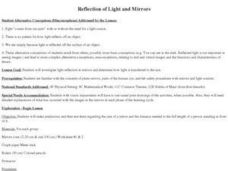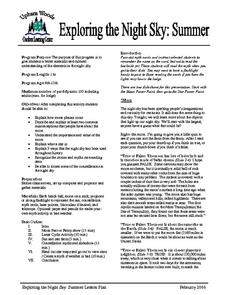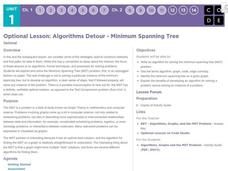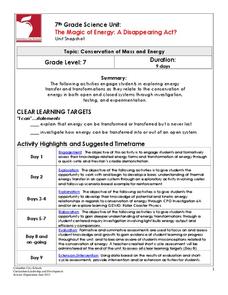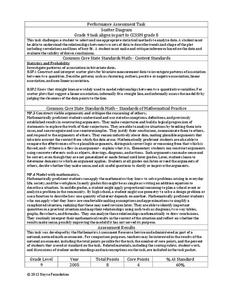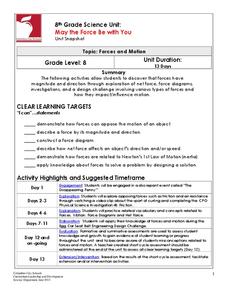Curated OER
Clash of Civilizations?
Students identify common misconceptions people have about cultures different than their own. After reading an article, they discover how the United Nations Alliance of Civilizations was founded. They research the misconceptions of the...
Curated OER
Three D Constellations
Students address a major misconception in astronomy, the understanding of scale. The lesson is designed to introduce students to both celestial coordinates and to the first rung on the distance determination ladder, parallax.
Curated OER
Reflection of Light and Mirrors
Students address common misconceptions concerning reflection, light and mirrors. They investigate light reflection in mirrors and determine how light is transferred to the eye. In addition, they make predictions and then test them...
Curated OER
Exploring the Night Sky: Summer
Students explain how moon phases occur. They describe and explain at least two common misconceptions that people have about the moon. Students explain what a star is. They explain 3 ways that the night sky has been used throughout history.
Curated OER
What's Matter?
Students explore many of the basic properties of matter including atoms, ions, elements, molecules, and density. The class explores an interactive flash-animated Web site to answer questions and clarify misconceptions they might have had...
Curated OER
Four Immigrant Groups: Their Lives and Music
Fourth graders examine the experiences of four immigrant groups. Class members brainstorm a list of misconceptions of those groups and discuss if these perceptions are still present today. Using maps, groups locate the countries of...
Curated OER
Rabies-The Global Connection!
Young scholars explore common misconceptions about rabies. In this health science lesson, students discuss how this disease can be treated and prevented. They research and create an information pamphlet about rabies.
Curated OER
Orbital Mechanics
Twelfth graders examine the misconceptions of Newton's laws of motion. In this motion and gravity lesson students interpret data and see the effects of gravity.
Curated OER
Heat Misconceptions
Third graders determine that gloves do not provide heat, but rather, they insulate or hold in any heat that is in their hand. They discuss the different temperatures found in ecosystems around the world. What do animals that live in...
Noyce Foundation
Time to Get Clean
It's assessment time! Determine your young mathematicians' understanding of elapsed time with this brief, five-question quiz.
BW Walch
Solving Systems of Linear Inequalities
One thing that puzzles a lot of young algebrists is the factors in a word problem that are taken as "understood". This presentation on solving systems of linear inequalities does a great job walking the learner through how to tease those...
Code.org
Algorithms Detour - Minimum Spanning Tree
This optional lesson introduces the class to the idea of a minimum spanning tree. The activity focuses on determining an algorithm that will find the most efficient path in a network to transfer data.
Mathematics Assessment Project
Evaluating Statements about Probability
Learners first complete an assessment task where they assess statements on probability. They then sort cards containing probability statements as being either true or false.
Columbus City Schools
The Magic of Energy: A Disappearing Act?
Using the 5E method for teaching about kinetic energy, potential energy, and conservation of energy, this two-week unit with many videos and possible extensions is sure to keep pupils engaged as they are learning.
Noyce Foundation
Truffles
Knowing how to scale a recipe is an important skill. Young mathematicians determine the amount of ingredients they need to make a certain number of truffles when given a recipe. They determine a relationship between ingredients given a...
Inside Mathematics
Quadratic (2006)
Most problems can be solved using more than one method. A worksheet includes just nine questions but many more ways to solve each. Scholars must graph, solve, and justify quadratic problems.
Inside Mathematics
Scatter Diagram
It is positive that how one performs on the first test relates to their performance on the second test. The three-question assessment has class members read and analyze a scatter plot of test scores. They must determine whether...
Inside Mathematics
Winning Spinners
Winning a spin game is random chance, right? Pupils create a table to determine the sample space of spinning two spinners. Individuals determine the probability of winning a game and then modify the spinners to increase the probability...
Columbus City Schools
Transformation: Energy in Disguise
Energy transformations happen everywhere, every second of the day. The energy transformation common to most scholars is potential and kinetic energy. The three-week lesson covers multiple types of energy transformations through...
Columbus City Schools
The Mystery of Earth’s History
Every living creature can leave a fossil record, yet most fossils belong to extinct organisms rather than ones currently living. Scholars learn about dating rock layers, fossils, and the environment of the past. Pupils understand that...
Cornell University
Constructing and Visualizing Topographic Profiles
Militaries throughout history have used topography information to plan strategies, yet many pupils today don't understand it. Scholars use Legos and a contour gauge to understand how to construct and visualize topographic profiles. This...
EngageNY
Real-World Positive and Negative Numbers and Zero
Class members investigate how positive and negative numbers are useful in the real world. Individuals first read a short passage and identify terms indicating positive and negative numbers. They consider situations involving positive...
Columbus City Schools
May the Force Be with You
You won't have to force your classes to complete these engaging activities! Through exploration, young scientists learn that force has both magnitude and direction. They draw force diagrams, investigate force models, and complete a...
Columbus City Schools
Thinking Like A Soil Scientist
Ready to roll up those sleeves and get your hands dirty? Dirty with soil science content, that is! Overcome those "But it's just dirt" objections with a trip outside to collect soil samples for some in-class analysis. Use the variety of...
Other popular searches
- Ice Age Misconceptions
- Alcohol Misconceptions
- Science Misconceptions
- Trigonometric Misconceptions
- Misconceptions in Science
- Life Science Misconceptions
- Math Misconceptions
- Physics Misconception
- Misconception Multiplication
- Sun Misconceptions
- Proofreading Misconceptions
- Misconception Oxygen Cycle




